A new dawn for Cuba as it opens for business
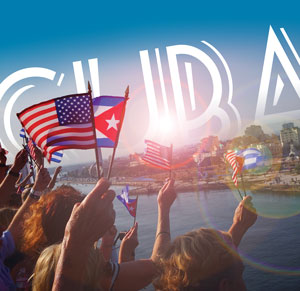
Photograph by Joe Cavaretta/South Florida Sun-Sentinel via AP
When Fidel Castro and his band of revolutionaries took control of Cuba in 1959, they established a Communist dictatorship antithetical to everything the U.S. represented—and aligned with America’s enemies. In 1961, a CIA-backed invasion by Cuban refugees to overthrow the Castro regime failed, almost from the moment it began, at the Bay of Pigs. The following year, the Cuban Missile Crisis nearly triggered World War III.
Former ABA President Stephen Zack had long expected the day would come when Cuba and the United States would finally break the Cold War-inspired status quo in place for more than half a century that has impoverished and isolated Cuba while creating a sworn enemy of America within 90 miles of its border. But like Godot saying he would be back any day now, Zack had expected a change for so long that he stopped expecting it.
The two countries haven’t had diplomatic relations since the Eisenhower administration, and a near-total embargo on American imports from and exports to Cuba has been in place since the early days of John F. Kennedy’s presidency. Meanwhile, the U.S. Department of State officially designated Cuba as a “state sponsor of terrorism” in 1982 for its history of supporting violent revolutionaries throughout the world. The designation functioned as a scarlet letter of sorts, as U.S. banks refused to lend money to domestic and foreign companies wishing to do business with countries on that list. Indeed, for most of the world, Cuba was forbidden territory.
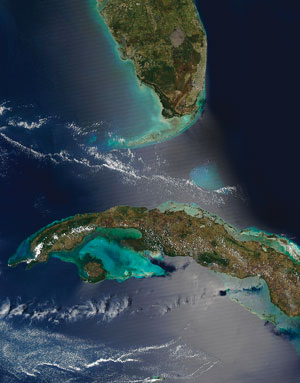
Shutterstock Photo
Then, suddenly, it happened. On Dec. 17, 2014, President Barack Obama surprised Zack and many, many others when he announced he would pursue normalization of relations with Cuba. What began as negotiations for a swap of long-imprisoned intelligence officers in both countries became a wide-ranging agreement that finally closes the curtain on nearly 60 years of hostility.
“There had been a lot of talk over the years that the president wanted to pursue normalization as part of his legacy,” says Zack, a Miami-based Boies, Schiller & Flexner administrative partner who escaped Cuba as a teenager barely two years after Castro and his Communists took power in the violent 1959 revolution. “But it hadn’t happened yet, and until the day he made his announcement, it seemed like it might not. I think everyone was surprised to a degree.”
According to the agreement, the United States will lift many of the travel restrictions in place for Americans wishing to visit the island. The U.S. will also make it easier for Cuban-Americans to send money to people living in Cuba. And the countries have agreed to re-establish diplomatic ties by reopening their respective embassies in Havana and Washington, D.C. Although the embargo remains in effect, it has been loosened considerably. Tourists can now bring limited quantities of cigars and rum into the U.S., for example.
More important, the loosening of the embargo has opened the door for U.S. businesses to move into the untapped and unknown Cuban market. U.S. banks now can transfer and receive funds directly from Cuba, a move that allows U.S.-based businesses to operate on the island nation. The U.S. also promised to re-evaluate Cuba’s designation as a state sponsor of terrorism, which it did in May 2015 when Obama officially removed Cuba from the terrorism list. That means U.S. banks can also give out loans to companies wanting to do business in Cuba.
For guidance and insight into how to navigate this uncharted territory, businesses have turned to a number of prominent Cuban-American and Latin American attorneys for advice. Many Cuban-American lawyers have mixed feelings about the thaw in relations between their adopted country and their ancestral homeland, and almost none of them have anything nice to say about the Castro regime that remains in power. However, they also see an opportunity—not just to help their clients but to bring about real and lasting changes in Cuba. Their hope is that increased engagement with people and activities there will force the country to accept democratic reforms, as well as develop a greater respect for the rule of law.

Positive relations between the United States and Cuba ended during the Eisenhower era. Fidel Castro was embraced by Soviet Premier Nikita Khrushchev, and it wasn’t long before the Bay of Pigs incident (1961) and the Cuban Missile Crisis (1962) would test the fortitude of the Kennedy administration and place an enduring strain on U.S. relations with the island nation. Photographs by AP Photo.
PROCEED WITH CAUTION
Akerman partners Pedro Freyre and Augusto Maxwell in Miami knew something was coming. The two, along with Akerman special adviser Matthew Aho in New York City, had been involved in discussions with the Obama administration about possible changes to U.S. regulations regarding Cuba in the run-up to the Seventh Summit of the Americas, which was held in April 2015 and included Cuba for the first time. “We were involved in that process for 1½ to two years, so we were kind of expecting” Obama’s announcement, Maxwell says. “But even we were taken aback by the scope of what he did.”
Like Zack, Freyre and Maxwell don’t have fond memories of the Castro regime, yet they have both maintained strong ties to officials, businesses and attorneys on the island over the years. Freyre, who chairs Akerman’s international practice, fled as an 11-year-old in 1960 with his parents. During the ill-fated Bay of Pigs invasion the following year, Freyre’s brother-in-law was killed and his older brother captured (Freyre’s father, a prominent lawyer during pre-Castro Cuba, negotiated for the release of his son and other prisoners in 1962). Maxwell, who chairs Akerman’s Cuba practice, also has a Bay of Pigs connection: His father was a member of one of the brigades of Cuban refugees set to take part in the invasion, but he ended up not seeing action.
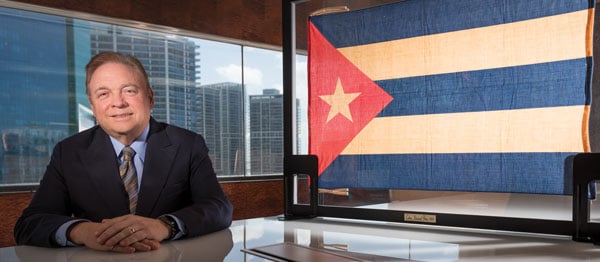
Former ABA President Stephen Zack (with a flag from pre-revolutionary Cuba in his office) escaped from the island as a teenager two years after Fidel Castro seized power. Photograph by Tom Salyer.
Despite that, both lawyers strongly believe the best way to move Cuba forward is to engage with the very regime that they and their families have opposed for generations. “We obviously grew up with some strong views about Cuban history,” says Maxwell. “That being said, as I look at these changes and Cuba’s future, I believe they are for the best and that Cuba will head in a stronger direction.”
Freyre goes further, saying he supported lifting the embargo completely. “If you want to talk the talk, then you must also walk the walk,” he says. “The best way to move forward is through engagement; and to do that, it is absolutely necessary to lift the embargo—lock, stock and barrel.”
The firm’s Cuban practice group acted quickly after Obama’s announcement. Taking advantage of the looser restrictions in place, Akerman helped Airbnb enter Cuba in April 2015. The online home-sharing platform announced it would list more than 1,000 rooms, couches, apartments and even villas in Havana and other cities. Within the first two months, the number of listings doubled to 2,000.
Before the thaw, it was nearly prohibitive for U.S.-based businesses (as well as foreign companies that did business with the U.S.) to conduct any kind of commerce in Cuba as a result of the embargo and the “state sponsor of terrorism” designation.
“Back then, most companies realized that the amount of business generated in Cuba was relatively minor compared to the risks and consequences of crossing the United States,” says Yosbel Ibarra, Greenberg Traurig’s Latin American and Iberian Practice Group co-chair, noting that most banks would refuse to lend to companies doing business in Cuba. “So the solution was simple. Companies stopped doing business with Cuba.”
By loosening the embargo and removing the terrorist label, the U.S. has sent a signal to its own businesses, as well as those around the world, that it’s OK to invest in and enter the once-renegade country.
“Suddenly, Cuba is no longer persona non grata,” Ibarra says. “And companies realize that they can get a competitive advantage if they establish themselves there before anyone else does.”
BACKDATED BUREAUCRACY
U.S. companies have to navigate a slew of federal rules and regulations if they wish to enter Cuba. For instance, they need a license from both the Office of Foreign Assets Control of the U.S. Department of the Treasury and the Bureau of Industry and Security of the Department of Commerce before opening up shop.
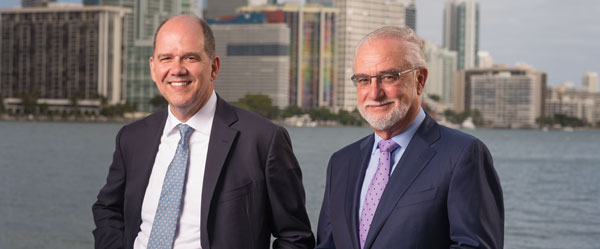
Augusto Maxwell and Pedro Freyre took part in U.S. regulatory talks regarding Cuba. Photograph by Tom Salyer.
“There’s a thicket of rules and regulations that anyone doing business in Cuba, whether it’s trade or investments, needs to be aware of,” says Richard Feinberg, a professor of international political economy at the University of California at San Diego. “Many of those rules and regulations date back to the 1960s. Some were codified in the ’90s, so businesses need to be up to date on everything.”
On the Cuban end, the process can be just as laborious. “The approval process is not entirely transparent and requires specialized legal counsel,” says Feinberg, whose book Open for Business: Building the New Cuban Economy is set to be released this month. “Companies must be sure to have a lawyer who has the necessary expertise and can help guide them through approval procedures, including which forms to fill out and which offices to access.”
It seems like a lot of work for a country that is hardly an economic powerhouse. “Cuba is a country with a population smaller than Guatemala’s. And its GDP is about $70 billion, so it’s a relatively small economy,” Ibarra says. However, he notes that, in the days after Obama’s December 2014 announcement, he was inundated with calls from business clients asking how to get into Cuba. “Americans haven’t been able to do anything there for a long time,” Ibarra says. “Maybe Cuba is like the forbidden fruit.”
EXPLOSION OF INTEREST
The initial wave of American-related business activity in Cuba since Obama’s announcement has been spurred by tourists. The tourism industry already had a footprint on the island nation as a result of President Bill Clinton’s 1999 decision to lift some travel restrictions. With Obama’s move, the remaining restrictions have been relaxed further, leading to a spike in tourism.
In February, the U.S. and Cuba signed an agreement allowing daily, direct commercial flights into Cuba for the first time since the revolution (previously, Americans had to take charter flights). Meanwhile, cruise lines were racing to see which one could reach Cuba first. Pearl Seas Cruises announced last summer it would start offering trips to the island. In April, however, Pearl Seas received a rude awakening when the government did not grant its approval. Ultimately, it was Adonia, a ship operated by Fathom Travel and owned by Miami-based Carnival Corp. that won the race, reaching Cuban land in May.
The travel boom has opened the door for other businesses to move into Cuba. In September, Verizon Wireless became the first U.S. cellular provider to offer roaming capability there, and two months later, Florida-based Stonegate Bank began offering debit MasterCards that can be used in Cuba.
Maxwell says Akerman clients are interested in expanding those existing possibilities as well as exploring more medium-range projects—such as establishing joint ventures with Cuban-based businesses—and long-term deals, including real estate investment. “There was a spectacular explosion of interest from clients last year, and that level of interest continues to be very high,” says Freyre. “Now we’re seeing the second wave and it’s important for U.S. businesses that have a more focused interest in Cuba to keep track of the regulations and how they are developing.”
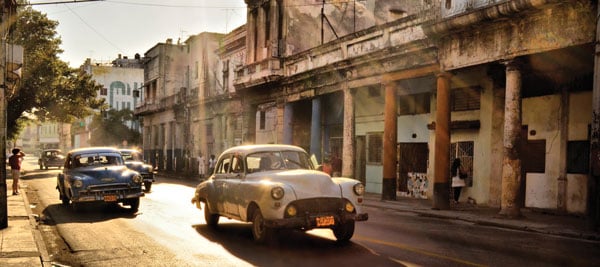
Getty Photo
The explosion of interest in business opportunities in Cuba comes with a caveat, though. “I think the best advice we can give to clients is to proceed with caution,” says Andrew Ittleman, co-founding partner of the Miami law firm Fuerst Ittleman David & Joseph. “Clients have to realize that they’re entering into a territory and culture that’s controlled by a government they haven’t had dealings with before. It’s important to be respectful of that government, as well as to be mindful of the fact that the Cuban regime may do things that are very different than what they are used to.”
Ittleman stresses that it’s important for businesses to understand Cuban culture and get to know the people on their own turf if they wish to succeed. “The corridor between us has the potential to be very, very big,” he says. “But you can’t just go there and start a business and assume it’ll be successful because you’ve succeeded elsewhere.”
For instance, businesses looking to get into Cuba will have to keep in mind that they’ll, essentially, be partners with the Castro regime. “The U.S. side is only half of the picture,” Ibarra notes. “The Cuban government controls every aspect of doing business on the island.”
ESTABLISHING THE RULE OF LAW
Since Obama’s announcement, Zack has made four trips to Cuba. He was there last August when Secretary of State John Kerry officially reopened the U.S. Embassy in Havana. A few months earlier, he visited his former home in Havana, which is now a bank. He found it hard to reconcile the sterile rows of cubicles with the warm and loving family home he remembered from his childhood. “It was bittersweet,” recalls Zack. “I don’t think anyone who went through what so many of us went through as far as losing everything and being forced to leave a country you loved could feel good about what occurred. But the sweet part is that, at some point in time, my children and their children can go back to Cuba and see where I was raised and have a better appreciation for the history of my family.”
That history includes seeing his family lose its livelihood and being forced to flee the country where he spent much of his childhood. Zack still remembers how his family’s three leather factories and two shoemaking facilities were seized by Castro’s troops and nationalized soon after the revolution. “Fidel promised everyone would get shoes, and we made the shoes, so it wasn’t a surprise when he seized the factories,” Zack recalls. When he and his family tried to flee to the United States in 1961, they were detained by the country’s spy agency, the G2. Placed in a glass holding cell at the Havana airport, they were strip-searched and forced to give up their valuables. Then he and his family were held under house arrest for a week or so before they were finally allowed to leave.
His experience helped inform his tenure as 2010-2011 ABA president and one of his main goals—to promote the rule of law. “Cuba’s constitution was very much like that of the U.S.,” he told the ABA Journal in 2011. “But I learned that words are not enough to protect you. In my family’s case, the loss of liberty was not just some theoretical exercise.” He is especially proud of his role in creating the Commission on Hispanic Legal Rights and Responsibilities, which he says was the first time the ABA focused specifically on Latino lawyers, including Cuban-American attorneys. In 2013, Obama appointed Zack as an alternate representative to the United Nations, and the former ABA president had a chance to see, up close, just what the rest of the world thought of the ongoing embargo. “When the vote came to lift the embargo, there were like three votes in opposition—one of which was the U.S.,” he says.
Zack is blunt about the obstacles facing American businesses that wish to develop enterprises on the island nation. “I advise clients that Cuba does not have a system of law like what we enjoy here. It’s important for clients to decide the risk-reward ratio going to Cuba. Remember, the government is 51 percent owner on just about everything. You always have greater risk when the government is the majority owner.”
NO PRIVATE PRACTICE
It’s a fallacy to suggest that Cuba lacks a legal foundation. As Freyre points out, the country has an elaborate set of laws, and almost all industries there are highly regulated. For instance, he points out that, if you want to run an airline to Cuba, the regulatory process is similar to what companies would have to do in the United States. Cuba also recognizes trademarks and patents from U.S.-based corporations and entities.
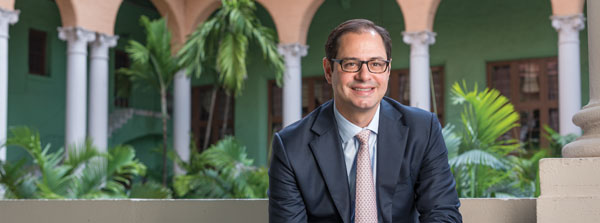
Yosbel Ibarra. Photograph by Tom Salyer.
It’s important to remember that the entire legal industry is regulated by the government. “Cuban lawyers have to work for a governmental law firm or agency,” Feinberg says. “There are no independent legal practices in Cuba. They are not yet tolerated, but I imagine they will be at some point.”
In fact, only three law firms are permitted to conduct business with foreign entities, says Aliette Rodz, a Cuban-American attorney who is a partner in the Miami office of Shutts & Bowen. She says that Cuban lawyers take the attorney-client privilege seriously, and that most Cuban lawyers she’s dealt with are professional, highly educated and well-versed in the law.
Of course, having rules and laws doesn’t mean that you have a rule of law. “We know that rule of law is not just passing legislation; it’s the implementation and respect for the rule of law,” Ibarra says. He notes that Cuba has very little history of foreign investment and it’s much too early to know whether a foreign entity would be able to get a fair shake in Cuban courts should it have a disagreement with the Castro regime.
“When we see a foreign entity that has made an investment in Cuba, has a disagreement with the Cuban government and can amicably reach a settlement or even win damages or reparations from the government, then that will establish Cuba as a safe place to do business,” says Ibarra. “Obviously this hasn’t happened yet, but it’s still early.”
In the meantime, lawyers advise businesses to learn to love international arbitration. “We’ve learned over the last 15 years that, in inter-national business transactions, the rule of law is best advanced in an arbitration environment,” says Mitchell Fuerst, co-founder and managing partner of Miami’s Fuerst Ittleman. “That is particularly true in Latin America, where certain locales have adopted very advanced arbitration laws.”
According to Carolyn Lamm—an international arbitration partner at White & Case in Washington, D.C., and another former ABA president—there is no shortage of treaties, international agreements and conventions they could invoke. Cuba has signed on to multiple international conventions and has negotiated many bilateral treaties with individual countries agreeing to use international arbitration to resolve investment disputes. In 1974, Cuba signed on to the Convention on the Recognition and Enforcement of Foreign Arbitral Awards, also known as the New York Convention.
In the years since, Cuba has signed on to several other treaties providing for international commercial arbitration of disputes with nationals of those countries. Lamm says that even if Cuba is not a party to an applicable treaty containing its consent to arbitration, companies could negotiate an arbitration clause in a contract with the state, including for investor-state dispute settlement. “Ultimately, if Cuba wants to encourage investments,” Lamm says, “it is in their interest to sign the requisite international agreements at some point.”
Americans can also learn from the experiences of our neighbors to the north. Unlike the U.S., Canada has steadily maintained relations with Cuba over the years and refused to cut ties, even after Castro came to power. Erik Richer La Flèche, a transactional partner in the Montreal office of Stikeman Elliott, has a blunt warning for American companies looking to do business there. “Cuba is a difficult place to do business,” says Richer La Flèche, who has worked on mining, telecommunications and manufacturing joint ventures with the Cuban government.
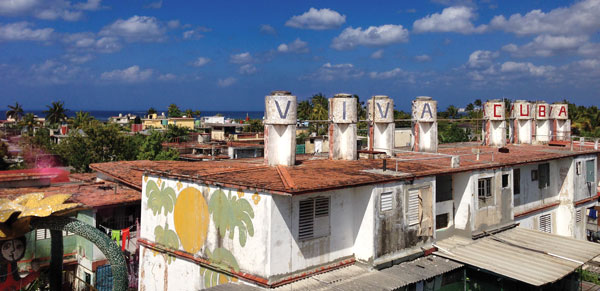
Photograph by Laura Lyons
According to him, Canadian companies have avoided Cuba during the last two decades because of the arbitrariness of the local legal system and the difficulties of dealing with the government. For instance, he says the government has sometimes ignored arbitration awards and suggests that companies wishing to do business with Cuba are better off structuring a transaction so that the non-Cuban entities have access to Cuban assets like bank accounts.
“You have to have a long-term view,” says Richer La Flèche, who has not gone to arbitration against the Cuban government but did prepare for one in a process that he says took five or six years. “You must structure your transactions to always protect yourself. You must structure transactions so that you are indispensable. It’s not enough to rely on rights and whatnot.”
Richer La Flèche hopes that this time, there will be permanent changes in Cuba as a result of increased engagement with the U.S.—especially in the tourism realm. “When you have to deal with tens or hundreds of thousands of American tourists demanding better services and infrastructure, that forces the Cuban government to improve,” he says. “I think the government will have no choice.”
Until then, he predicts that Canadian companies will continue to sit on the sidelines. “We’re waiting for the Americans to start doing lots of business with Cuba in the hope that it convinces Cuba to liberalize its laws and rules regarding foreign investments,” he says. “Because, right now, it’s too difficult to do business with them.”
PRIVATIZATION CONVERSATION
Will Cubans welcome American legal traditions? There are some signs they might. Anna Marie Hernandez, president of the Cuban American Bar Association and a partner in the Miami office of Holland & Knight, sees the expansion of American businesses into the area as an opportunity to bring about change.
“When you enter into a joint venture with the government, you can, theoretically, negotiate for certain terms for workers, like higher wages and employment rights and things like that,” she says. “We’ve heard from a lawyer in Cuba that workers on these joint ventures tend to get paid more than the average Cuban worker, but it’s still very early in the process.”
One area where Akerman’s Maxwell has seen the beginnings of change is in the legal profession itself. “One of the things that’s really encouraging is that there has been an exchange of ideas and language between Cuban lawyers and American lawyers,” he says. “Cubans understand that it’s hard for us to wrap our heads around the idea that a client would be represented by a law firm that’s part of the government.”

Cuban-American attorney Aliette Rodz. Courtesy of Aliette Rodz.
But according to Maxwell, there has been a “conversation” with Cuban officials about allowing some private firms to operate in the country.
Ibarra, for his part, says he’s not aware of any conversations about privatizing law firms. “When you talk to Cuban lawyers, they would tell you that they are independent, but I’m not sure we’d classify them the same way,” he notes. “There is a tremendous hunger to learn on the part of Cuban lawyers, and as there is more dialogue between us and them, then we can teach them more about our legal traditions and we can learn about theirs.”
Rodz, meanwhile, says private industry does exist in Cuba and posits that the government could eventually allow private firms to exist. In September 2014, for instance, the government authorized the privatization of more than 9,000 restaurants throughout the country—a huge jump from the roughly 1,200 private restaurants already in existence.
“If you speak to the Cuban lawyers, they feel a sense of openness and consideration for what works and what doesn’t,” says Rodz. “We’ve seen how privatization can work for restaurants in Cuba. I think they’re open to all possible changes; they are open and welcoming.”
These attorneys all emphasize that cooperation is a two-way street, and that it is imperative for the U.S. to be committed to improving relations with Cuba. Peter Quinter, a shareholder and chair of the Customs and International Trade Law Group at Florida law firm Gray Robinson, argues that the regulatory process for approving applications to conduct business there is still too onerous. He says the Office of Foreign Assets Control has been processing applications faster ever since the thaw, but that the process still takes at least nine months. “I think it’s a staffing issue,” says Quinter. “OFAC needs more employees, attorneys and funding. They seem overwhelmed, and it’s unfortunate.”
While many Cuban-Americans have reacted favorably to the thaw—according to a Florida International University poll taken after Obama’s executive action, more than two-thirds of Cuban-Americans favor lifting travel restrictions and re-establishing diplomatic relations—an entire generation remains unmoved.
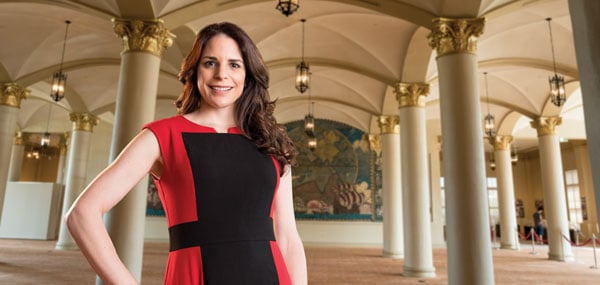
Anna Marie Hernandez in the Freedom Tower, where Cuban refugees were processed from 1962 to ’74. It now houses the Miami Dade College Museum of Art & Design. Photograph by Tom Salyer.
“The issue of compensation for seized property is a daily topic in my household,” Hernandez says. “Most of us would like to be able to assist people who lost property and compensate them, if that’s possible.” Right now, however, the priority seems to be with developing commerce and enabling U.S. businesses to go into Cuba, and Hernandez concedes it might be an uphill struggle to get reparations for lost property. “We haven’t really seen it happen on a large scale, other than with Holocaust victims,” she says. “Maybe that can serve as a model for us.”
The landscape could change even more after the November presidential election. The next president could simply undo all of Obama’s executive actions with one stroke of the pen. Indeed, at the time Obama made his announcement, almost every Republican candidate then running to replace him criticized his move. Sen. Marco Rubio, whose parents emigrated from Cuba, vowed to go back to the pre-Cuban-thaw status quo while Sen. Ted Cruz—whose father fled Cuba after, briefly, being part of Castro’s revolution—accused Obama of surrendering to the Castros. One of the only Republican candidates who has supported normalization of relations with Cuba has been Donald Trump, although he claims he would have gotten a better deal.
On the Democratic side of the aisle, both former Secretary of State Hillary Clinton and Sen. Bernie Sanders have approved of Obama’s action, with Clinton saying “engagement is not a gift to the Castros; it is a threat to the Castros.”

Peter Quinter. Photograph by Tom Salyer.
Despite the rhetoric, most authorities on Cuba believe it will be difficult, if not impossible, to reverse the new course of U.S. relations with the nation. “It is possible that the next president could simply cancel Obama’s executive orders and reverse them and we’d be back to pre-December 2014,” Quinter says. “I don’t expect it to happen, though. I think the country is eager to relax and eventually terminate the embargo. It’s a Cold War relic and it makes no sense to continue a failed policy that only hurts Cubans and Americans.”
Zack is more cautious, saying “I wouldn’t dare predict what might happen with a change in administration” but that the process of normalization could continue to move forward no matter who is in the Oval Office. “Then again, there’s a limit based on what the president can do,” he says. “We can’t get [Jeffrey DeLaurentis] confirmed as ambassador to Cuba by the Senate.”
Cuban-American lawyers also stress that America shouldn’t expect to simply impose its way of life and system of laws on Cuba and expect Cubans to just accept them. “We need to understand that we are the United States and they are Cuba,” Rodz says. “We are not going to pretend that they are going to assimilate or acquire our rules.”
Freyre agrees, noting that “Cuba always does things the Cuban way,” and that, regardless of what the United States does or does not do, Cuba is already standing on the precipice of change. “We’re coming to the end of a dramatic stage in Cuban history,” says Freyre. “Pretty soon, Cuba won’t have a Castro in charge for the first time in over half a century. When that happens, it’ll be a very dramatic inflection point for Cuba.”
This article originally appeared in the June 2016 issue of the ABA Journal with this headline: “A New Dawn for Cuba: An abrupt departure from the status quo means Cuba is now open for business.”
Write a letter to the editor, share a story tip or update, or report an error.


